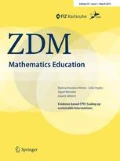Abstract
This article explores the idea that theoretical approaches might be usefully compared in terms of the ways in which they lead researchers to construe commonsense classroom problems. It reports an experience when one such problem was posed to a range of researchers with different theoretical backgrounds. They were invited to propose an answer, and to reframe the classroom problem as a research problem. As anticipated, responses adopted particular theoretical perspectives that “privileged” certain objects of study and modes of explanation. Nevertheless, where responses did appeal to a common theoretical perspective, sometimes used in combination with others, there could be quite sharp differences in conceptualisation, proposed action, and research intention.


Similar content being viewed by others
References
Artigue, M., Dreyfus, T., Bartolini-Bussi, M., Gray, E., & Prediger, S. (2006). Different theoretical perspectives and approaches in research in mathematics education. In M. Bosch (Ed.), Proceedings of the 4th CERME (pp. 1239–1244). Sant Feliu de Guixols 2005, Fundemi IQS—Universitat 2006.
Arzarello, F., Bosch, M., Lenfant, A., & Prediger, S. (2008). Different theoretical perspectives in research. In Pitta-Pantazi, Demetra/Phillipou & George (Eds.), Proceedings of the 5th congress of the European society for research in mathematics education (CERME 5) Cyprus 2007, ERME 2008 (pp. 1618–1627).
Arzarello, F. (2006). Semiosis as a multimodal process. Revista Latino Americana de Investigacion en Matematica Educativa, Especial, 267–299.
Arzarello, F. (2008). Mathematical landscapes and their inhabitants: perceptions, languages, theories. In M. Niss, et al. (Eds.), Proceedings of ICME 10. Plenary lecture (in press).
Bergsten, C. (2008). How do theories influence the research on teaching and learning limits of functions? in this issue.
Bikner-Ahsbahs, A., & Prediger, S. (2006). Diversity of theories in mathematics education—How can we deal with it? Zentralblatt für Didaktik der Mathematik, 38(1), 52–57.
Brousseau, G. (1997). The theory of didactical situations in mathematics. Dordrecht: Kluwer.
Chevallard, Y. (1992). Concepts fondamentaux de la didactique: Perspectives apportées par une approche anthropologique. Recherches en Didactique des Mathématiques, 12(1), 73–112.
Cobb, P. (2007). Putting philosophy to work. Coping with multiple theoretical perspectives. In F. K. Lester (Ed.), Second handbook of research on mathematics teaching and learning (pp. 3–38). Reston: NCTM.
Dreyfus, T., Hershkowitz R., & Schwarz B. B. (2001). Abstraction in context II: The case of peer interaction. Cognitive Science Quarterly, 1(3/4), 307–368.
Hershkowitz, R., Schwarz, B. B., & Dreyfus, T. (2001). Abstraction in context: Epistemic actions. Journal for Research in Mathematics Education, 32, 195–222.
Jungwirth, H. (1996). Symbolic interactionsm and ethnomethodology as a theoretical framework for the research on gender and mathematics. In: G. Hanna (Ed.), Towards gender equity in mathematics education. An ICME study (pp. 49–70). Dordrecht: Kluwer.
Lerman, S. (2006). Theories of mathematics education: Is plurality a problem? Zentralblatt für Didaktik der Mathematik, 38(1), 8–13.
Lester, F. K. (2005). On the theoretical, conceptual, and philosophical foundations for research in mathematics education. Zentralblatt für Didaktik der Mathematik, 37(6), 457–467.
Peirce, C. S. (1905ff). Collected papers of Charles Sanders Peirce (Vol. 5). In C. Hartshorne & P. Weiss (Eds.). Cambridge MA: Harvard University Press, 1958.
Prediger, S., & Ruthven, K. (2008). From teaching problems to research problems. Proposing a way of comparing theoretical approaches. In Pitta-Pantazi, Demetra/Phillipou & George (Eds.), Proceedings of the 5th congress of the European society for research in mathematics education (CERME 5) Cyprus 2007, ERME 2008 (pp. 1745–1771).
Schoenfeld, A. H. (2007). Method. In F. K. Lester (Ed.), Second handbook of research on mathematics teaching and learning (pp. 69–107). Reston: NCTM.
Schwarz, B. B., Dreyfus, T., & Hershkowitz, R. (2008). The nested epistemic actions model of abstraction in context. Technical report. (Book Chapter in preparation).
Silver, E., & Herbst, P. (2007). Theory in mathematics education scholarship. In: F. K. Lester (Eds.), Second handbook of research on mathematics teaching and learning (pp. 39–67). Reston: NCTM.
Sriraman, B. & English, L. D. (2005/2006). Theories of mathematics education: A global survey of theoretical frameworks/trends in mathematics education research. Zentralblatt für Didaktik der Mathemati, 37(6) and 38(1).
Voigt, J. (1989). Social functions of routines and consequences for subject matter learning. International Journal of Educational Research, 13, 647–656.
Acknowledgments
This article would not have been written without Kenneth Ruthven who co-led the experience itself and accompanied the development of the paper with critical discussion and ideas. Also Marianna Bosch and the reviewers have significantly contributed to the process by challenging comments and questions. I thank all of them!
Author information
Authors and Affiliations
Corresponding author
Rights and permissions
About this article
Cite this article
Prediger, S. How are theoretical approaches expressed in research practices? A report on an experience in comparing theoretical approaches with respect to the construction of research problems. ZDM Mathematics Education 40, 277–286 (2008). https://doi.org/10.1007/s11858-008-0076-1
Accepted:
Published:
Issue Date:
DOI: https://doi.org/10.1007/s11858-008-0076-1




